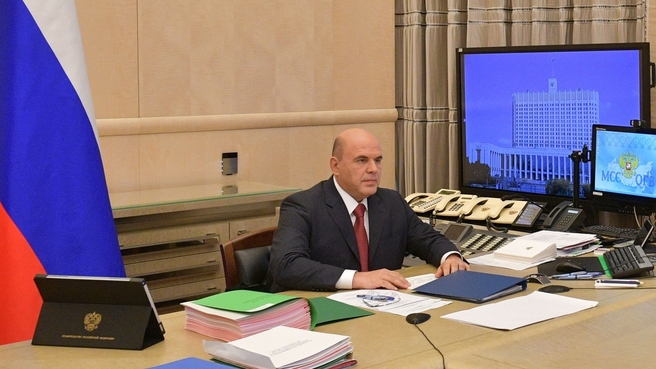The agenda includes the nationwide economic recovery plan, the national programme for the socioeconomic development of Russia’s Far East, and personal income tax.
Excerpts from Mikhail Mishustin’s opening remarks:
Good afternoon, colleagues. The Government is completing its work on the national action plan to restore employment and people’s incomes, as well as to provide economic growth and long-term structural changes in the economy. Importantly, a number of the related measures are already underway, and the plan is synchronised with the draft budget for the next three years.
We all are well aware of the effects the coronavirus pandemic has had on people’s incomes and overall economic development. We have to re-launch positive processes and continue to advance. The plan aims to restore full employment and purchasing power, support individual, small and medium-sized businesses, launch a new investment cycle, improve the business environment, accelerate technological development of the economy, boost exports, and support import substitution.
Today, we will also review the National Programme for the Socioeconomic Development of the Russian Far East until 2024 and for the next 15 years, which has been developed in accordance with the President’s instruction. His executive order specifies the main strategic goals of the national policy in the Far Eastern regions. Within the next four years, all key indicators of quality of life in these regions should grow faster than Russia’s average. Efforts should be taken to improve the demographic situation and curb the migration outflow.
We have to do substantial work in many areas. We have to provide the necessary working and living conditions for the people to stay and work in the Far East, including comfortable, up-to-date housing, jobs with an adequate salary, and most importantly, good opportunities for their future. The national programme envisages that within the next few years all economic development indicators will show progressive growth, including through boosting cumulative investment to 800 billion roubles. According to the plans, housing construction volumes will increase by over 50 percent by 2024. At least 200 enterprises and 30,000 new jobs will be created in priority socioeconomic development areas as well as at the Free Port of Vladivostok.
The National Programme for the Socioeconomic Development of the Russian Far East is a comprehensive strategy; it includes goals that have already been set in a number of existing national projects and state programmes. I ask related ministries and agencies to closely supervise these efforts.
Let us go back to the issue we considered at the previous meeting. Under the President’s instruction, starting next year the income tax rate for individuals earning an annual income of more than 5 million roubles will increase from 13 to 15 percent. This tax rate will apply only to the amount in excess of the 5 million roubles per year, not the entire income. The money will go towards treating children with serious and rare diseases.
The Government has drawn up a draft law that has been submitted to the State Duma. We have managed to develop a mechanism that would be as easy for people as possible, without the necessity of obtaining documents or certificates in the case of more than one source of income. This work will be performed by the tax service; at the end of the year, a person will be notified of the necessity to pay the tax. Not all the funds will go to the budget next year; some will be received only in 2022. Yet, money for treating kids with rare diseases should be available in 2021; we have earmarked it in the draft budget.
I should remind you that the President also gave an instruction to define the types of income to which the increased tax rate will apply.
We cannot just automatically apply the norms of the existing law to the new tax; we must specify which types of income should be included in the draft law and which should be excluded.
I believe that this issue should be discussed publicly, and I ask the Ministry of Finance, together with the parliament and regions, to further address these issues to define the base for the 15 percent income tax. I think this approach aligns with the principle of social equity as well as with the social responsibility of citizens who have an income above the average. This is the core of the draft law.
<…>












